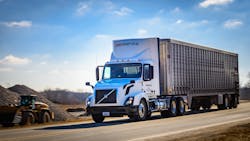America can’t keep ignoring infrastructure development
In its report, “Failure to Act,” the American Society of Civil Engineers (ASCE), found that the result of years of underfunding the surface transportation infrastructure has caused the system to continue to deteriorate. It further found that if steps aren’t taken to make the necessary investments in infrastructure, there will be significant negative consequences to the U.S. economy.
ASCE believes it will take $4.1 trillion in spending to improve infrastructure. Failure to make the needed investments will have a significant impact on the trucking industry, with increased congestion being one of the big problems that will develop.
This will have a domino effect in that it will cause delays in delivery, increase cost, result in increased fuel consumption, and exacerbate the already bad driver shortage.
Conversely, investment in our nation’s infrastructure could create jobs — good jobs. This would be akin to what the country saw in the 1930s and 1940s with programs like Work Projects Administration (WPA), Civilian Conservation Corps (CCC), and Tennessee Valley Authority (TVA). Many of these projects were part of President Franklin D. Roosevelt’s New Deal, as a response to the Great Depression.
Fixing the infrastructure is not “make” work. A D+ is how ASCE rated the U.S. Infrastructure in its 2017 Infrastructure Report Card. The D rating means poor or at risk. Every aspect of our infrastructure — roads, bridges, tunnels — are in abysmal condition.
While the condition of the infrastructure is always important, as we are the cusp of some significant technological changes in the transportation industry, a poor infrastructure could be a hinderance to those developments.
In addition, COVID-19 has changed people’s awareness of and appreciation for trucking but has also meant that more people have higher expectations about the timely delivery of their orders. Having the right trucks and enough drivers is part of being able to meet that need, but unless the roads and bridges are in good condition to accommodate truck traffic, there will be serious disruption to the supply chain and on-time deliveries could suffer.
It is up to each of us to lobby for the needed work on the infrastructure. The Highway Trust Fund was established in 1956 to provide a dependable way to fund the Interstate Highway System. Today, revenues for the Fund come from federal taxes on gasoline and diesel fuel and are supposed to be used to maintain roads, bridges, and tunnels. However, in recent years money has been diverted from the Fund to be used for other purposes.
This has to stop, and the Highway Trust Fund must be used for their intended purpose.
There is much work to be done to renovate and improve our roadways. The need is more urgent than ever. Buying patterns have changed, and there is even more pressure on transportation to get goods into the hands of consumers where they want them and as quickly as possible.
We need to do what we can to ensure that funds that are set aside for our infrastructure are being used for their intended purpose so we can avoid a hit to the economy.
_____________________________
Joseph Evangelist joined Transervice in 2007 and currently serves as executive vice president of sales, operations and staff responsibilities. Heavily involved in new business development and account management, his day-to-day focus consists of post-acquisition assimilation planning to maximize new growth and business combination opportunities.
About the Author
Joseph Evangelist
Joseph Evangelist previously served as EVP for Transervice, president of LLT International Inc., and CEO of Lend Lease Trucks Inc. Evangelist is a seasoned transportation executive with domestic and international experience in sales, operations, mergers, and acquisitions.
